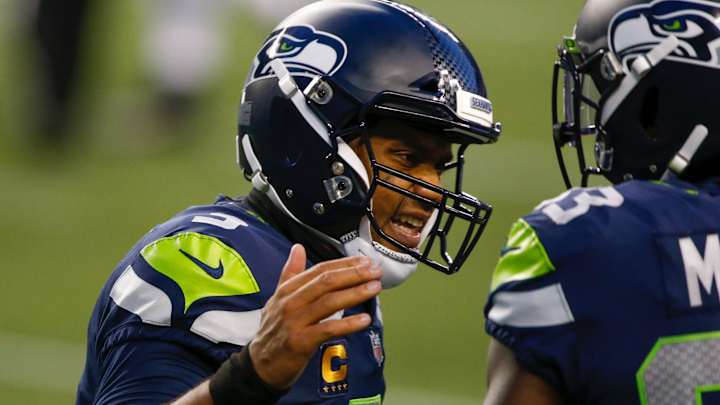Russell Wilson Is Forcing MVP Voters to Pay Attention

Much has been made about the fact that Russell Wilson has not had a single MVP vote to this point, this, despite being one of the better players in the league throughout his eight years in the NFL.
Of course, the refrain ignores the fact that each and every time Wilson has been great he has been unfortunately eclipsed by some sort of generational season from elsewhere. Last year, Lamar Jackson was a prime example of the fellow stars that populated Wilson’s stratosphere. Voters were not overlooking Wilson’s greatness, they were simply forced into submission by another candidate.
So Wilson decided this season to find a way around the process and insert himself at the front of the line: Leave no doubt, and destroy all opposing forces in the process.
.@DangeRussWilson to @TDLockett12 for the 43-yard TD 🙌#GoHawks x #DALvsSEA
— Seattle Seahawks (@Seahawks) September 27, 2020
📺: FOX https://t.co/LdPmSSqr3g
After Sunday’s win over the Cowboys, a second straight five-touchdown performance, Wilson now has 14 passing touchdowns over three weeks – four more than the next closest quarterback and the most through three games in NFL history. You can scoop your hands into the analytical ocean and come up with any number of golden nuggets about Wilson’s brilliance; how he’s completing about ten percent more of his passes than he actually should be. That he’s averaging a quarterback rating in the high 130s. That his DVOA, which represents how much better he is than the average quarterback on a given play is a plus-59.5, by far the highest number in the NFL (for reference, Carson Wentz was a minus-69 heading into this week). That his bad throw percentage has never been lower. That his on-target passing percentage has never been higher.
All of this while his defense allows the opposition to creep back in ever so slightly, thus compounding the need for more offense.
Before the start of the 2020 season, we had a chance to sit down with Wilson and speak to members of his performance team about their outlook for the year. What was notable during that time was the near defiance with which they touted this season as the start of a new era for Wilson. There was a somewhat playful, yet not-so-subtle reminder that all the things we’d come to adore about the new generation of quarterbacks were attributes that Wilson had possessed for years (and he can throw behind his back, you know). That, when the offense adjusted to meet his progress, rapid growth would happen.
The Big Interview: Russell Wilson
Wilson has always been uniquely hard to game plan against, but was not always uniquely game planned for.
And so here we are. On Sunday against the Cowboys, Wilson was again unstoppable. As he continues to establish DK Metcalf as both a legitimate No. 2 receiver and once-a-week deep matchup destroyer, he continues to legitimize the decision to back away from a more traditional run/pass ratio familiar to Pete Carroll in his early coaching days. There is no better deep-ball quarterback in the NFL right now. Outside of Jackson, there may not be a more difficult quarterback to bring down in the pocket right now. Wilson has attempted more passes than 23 other qualifying quarterbacks in the NFL this year and yet, outside of Baker Mayfield of the play-action obsessed Browns, no one spends more time between snap to throw.
.@DangeRussWilson and @dkm14 connect for six!
— Seattle Seahawks (@Seahawks) September 27, 2020
📺: FOX https://t.co/Xi4eQDzdYw
It all combines into a fairly incredible portrait of a quarterback who has been constantly evolving somewhere outside our consciousness. We often didn’t notice because our attention was diverted somewhere else.
Now, the question isn’t about how MVP voters could have overlooked some of the subtle nuances and improvements over the years. The question will be how they could possibly ignore them.

Conor Orr is a senior writer for Sports Illustrated, where he covers the NFL and cohosts the MMQB Podcast. Orr has been covering the NFL for more than a decade and is a member of the Pro Football Writers of America. His work has been published in The Best American Sports Writing book series and he previously worked for The Newark Star-Ledger and NFL Media. Orr is an avid runner and youth sports coach who lives in New Jersey with his wife, two children and a loving terrier named Ernie.
Follow ConorOrr